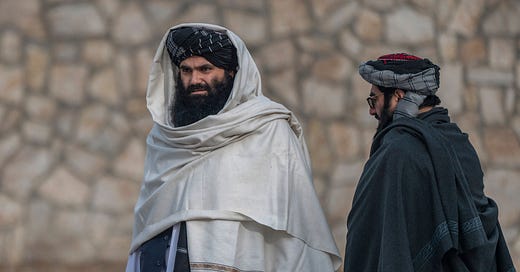
Why Is the Head of the Terrorist Haqqani Network Traveling with Impunity?
He visited the UAE and then Saudi Arabia to make the the Hajj.
I HUNTED SIRAJUDDIN HAQQANI for nearly twenty years. In 2008, I sparred with his fighters in Kapisa in northeastern Afghanistan. In 2012, he murdered Afghan allies of mine as they went to visit a bazaar just because they had talked to me. In 2014, the Afghan general I advised lost hundreds of sources who had tried to infiltrate the Haqqani network. The pictures of their mutilated bodies are forever ingrained in my mind.
But it wasn’t until America’s final year in Afghanistan that I understood the man. That’s because I started listening to the Afghans in senior roles. They, as always, were my teachers.
“What’s Sirajuddin’s endgame, brother?” I asked my most insightful Afghan contact, Colonel Abdul Rahman Rahmani, a counterterrorism officer in Afghanistan’s Office of the National Security Council.
“That’s an important question, Will,” he smirked. “You’re asking the right questions. You’re learning.”
We would talk like this every week. Rahmani, a former pilot with the Afghan Air Force’s legendary Special Mission Wing and a graduate of the National Defense University in Washington, D.C., knew the Taliban intimately, having grown up in their madrasas.
“He’s cunning like his father,” Rahmani said, referring to Jalaluddin Haqqani, who built up the Pakistan-headquartered group whose tentacles reached stranglingly deep into Afghanistan. “But, remember, while Haqqani”—father, son, the whole network—“will say a lot of things, Pakistani Inter-Service Intelligence controls them. When you think of Haqqani, you should immediately place the Pakistani flag behind him.”
Rahmani was right, of course. Everyone knew it. In 2008, Admiral Mike Mullen, then the chairman of the Joint Chiefs of Staff, testified before Congress on Haqqani’s ties to Pakistan’s ISI.
The fact remains that the Quetta Shura [Taliban] and the Haqqani Network operate from Pakistan with impunity. For example, we believe the Haqqani Network—which has long enjoyed the support and protection of the Pakistani government and is, in many ways, a strategic arm of Pakistan’s Inter-Services Intelligence Agency—is responsible for the September 13th[, 2011] attacks against the U.S. Embassy in Kabul.
SO WHY HAS SIRAJUDDIN HAQQANI, a terrorist mastermind responsible for the deaths of thousands, including many Americans, a man with a $10 million FBI reward on his head, been given the green light to visit the UAE, an ally that hosts thousands of American service members? Why is he walking around the United Arab Emirates and Saudi Arabia like a normal tourist?
In the last week, Haqqani visited the UAE and met with its president, Sheikh Mohamed bin Zayed al Nahyan, before proceeding to visit Mecca.
Then, the most crucial part of Sirajj’s vacation, his trip to Saudi Arabia. Over the weekend, social media accounts linked to Haqqani livestreamed his visit. While the Hajj doesn’t start for another week, a video circulating of Haqqani in Mecca will boost his position within the Taliban government.
“Siraj is trying to fulfill one of the five major pillars of Islam by participating in a pilgrimage to Mecca,” Maj. (retired) Jason Howk, a professor of Islamic Studies at the Air Force Special Operations School, told The Bulwark. “But for decades, he has broken sura after sura. Instead Haqqani chose to murder Muslim women, children, and the elderly.”
There’s no chance that the Biden administration did not know about Haqqani’s gambit. Haqqani was on a UN sanctions list that was supposed to prevent him from traveling abroad.
During a press conference last week, a State Department official responded tersely to a question about Haqqani’s travel abroad.
“I would just note that member-states hosting UN-sanctioned Taliban members must seek permission for travel through an exemption process, as outlined by the UN 1988 Sanctions Committee, and it’s important that member-states follow these procedures,” Mathew Miller told a regular news conference in Washington.
The Biden administration could have kept this from happening.
WHILE THE SIGNIFICANCE OF FACTIONS inside the Taliban has always been hotly debated among analysts, there have been tensions between Haqqani and the Taliban Supreme Leader Hibatullah Akhundzada. Mullah Omar’s son, Mullah Yaqoob, is a major player and has been Afghanistan’s minister of defense since the Taliban takeover in 2021. Haqqani, though, has always been Pakistan’s favorite. The fact that Saudi Arabia, the UAE, the United States, and Pakistan all acquiesced to his visit suggests that they’re trying to elevate him in relation to other powerful figures in Kabul.
“Given that two of America’s biggest purported allies in Middle East, Saudi Arabia and the UAE, have permitted Siraj, a specially designated global terrorist, to enter their country, it is clear that it is only a matter of time [until] the Taliban will be officially recognized as the government of Afghanistan,” Bill Roggio, editor of the Long War Journal told The Bulwark. “The Biden administration’s silence on his presence indicates that the U.S. is comfortable with that.”
Pakistan’s ISI has likely been whispering to American interlocutors that Haqqani is the least-bad option for ruling Afghanistan. It wouldn’t be the first time Pakistan has manipulated its way into choosing Afghanistan’s rulers by making the United States its semi-witting accomplice.
Throughout the Soviet Union’s misadventure in Afghanistan, the United States provided the ISI with money and equipment to pass to the Afghan resistance. Pakistan used it to empower the worst elements in the Afghan anti-Soviet coalition, including, in the 1980s, Gulbuddin Hekmatyar, the “Butcher of Kabul,” who turned that city into a free-fire zone, and, in the 1990s, Mullah Omar’s Taliban movement, which provided Al Qaeda a safe haven to conduct the 9/11 attacks. Now, apparently, the ISI is selling the United States on Haqqani.
It won’t work. Haqqani isn’t just some senior Taliban leader. He has long and extensive contacts with al Qaeda, including familial connections through his second wife, who is the sister of a senior al Qaeda operative.
“Sirajuddin, the so-called interior minister of Afghanistan, is a specially designated international terrorist,” Rear Adm. (retired) Pal Becker, the former director for intelligence for coalition forces in Afghanistan, told The Bulwark. “He is the leader of the savage Haqqani Network, based in Pakistan, that maintains very close ties to al Qaeda.”
Moreover, al Qaeda is in Afghanistan. They have numerous training camps throughout the country. Recently, Sayf al-Adl, al Qaeda’s leader, wrote that “the loyal people of the Ummah [worldwide Islamic community] interested in change must go to Afghanistan, learn from its conditions, and benefit from their [the Taliban’s] experience.” In short, al Qaeda’s leader called for foreign fighters to visit Afghanistan and take what they learned back to their home country.
It’s like it’s 1996 all over again.
Haqqani will be only too happy to help facilitate the training of new terrorists at al Qaeda-run, Taliban-hosted training camps.
WHEN PRESIDENT BIDEN DECIDED to accelerate the withdrawal from Afghanistan in 2021, he probably thought it best to rip the Band-Aid off and move on to other issues. But the wound hasn’t healed. The over-the-horizon counterterrorism strategy Biden explicated after the last U.S. troops left Kabul is unlikely to succeed since it relies on access to Pakistani airspace. Further, the lack of human intelligence assets on the ground makes it hard to know the identities and live locations of terrorists. So, the Biden administration may believe that tipping the scales in favor of the least-worst terrorist is their only option.
There are other possible explanations for why the Biden administration didn’t lean on Pakistan, Saudi Arabia, and the UAE to scuttle Haqqani’s international excursion. They may have made the decision that it was more important to focus on working with the Gulf states on a post-war reconstruction program for Gaza. Or it could be that the desks at the State Department, Defense Department, and National Security Council that deal with the Middle East are too focused on the war in Gaza to have made time to do anything about Haqqani.
If the administration, especially the intelligence community, knew about Haqqani’s visit and affirmatively chose to allow it, it’s unclear what the triple-bank shot of elevating Haqqani was intended to accomplish. But there’s another reason not to try to normalize Haqqani, a reason that may not have entered their calculations: the damage it will cause to America’s Afghan combat veterans.
“It’s bad enough that a handful of volunteer veterans gave most of their youth to a twenty-year war only to watch our Afghan allies left on the side of the road to be hunted and killed,” LTC (retired) Scott Mann, a former Green Beret with multiple deployments to Afghanistan, told The Bulwark. “But to see the very terrorist who killed so many of our buddies traveling abroad with impunity is the ultimate moral injury.”
The Biden administration must take this critical factor into account. While it has quietly continued evacuating Afghan allies without much fanfare, including by successfully extending the special immigrant visa program, it brings discredit on that vital work if the United States is seen as propping up a man with American blood on his hands.
“It adds another layer of understanding to the discussion of moral injury,” Kate Kovarovic, a civilian volunteer who helped provide mental-health support to hundreds of Americans involved in Afghan withdrawal, told The Bulwark. “Veterans are watching this happen, and they know that it’s wrong. They become so demoralized that they suffer mental harm as a result.”
Whereas previous presidents have made a habit of ending their speeches with “God bless America,” Biden often ends his speeches with “God bless our troops.” It’s a nice sentiment. But there is something cynical or hypocritical—or both—in talking about supporting the troops while empowering those who killed them.

















